Mises, Ludwig von. Human Action: A Treatise on Economics
Подождите немного. Документ загружается.

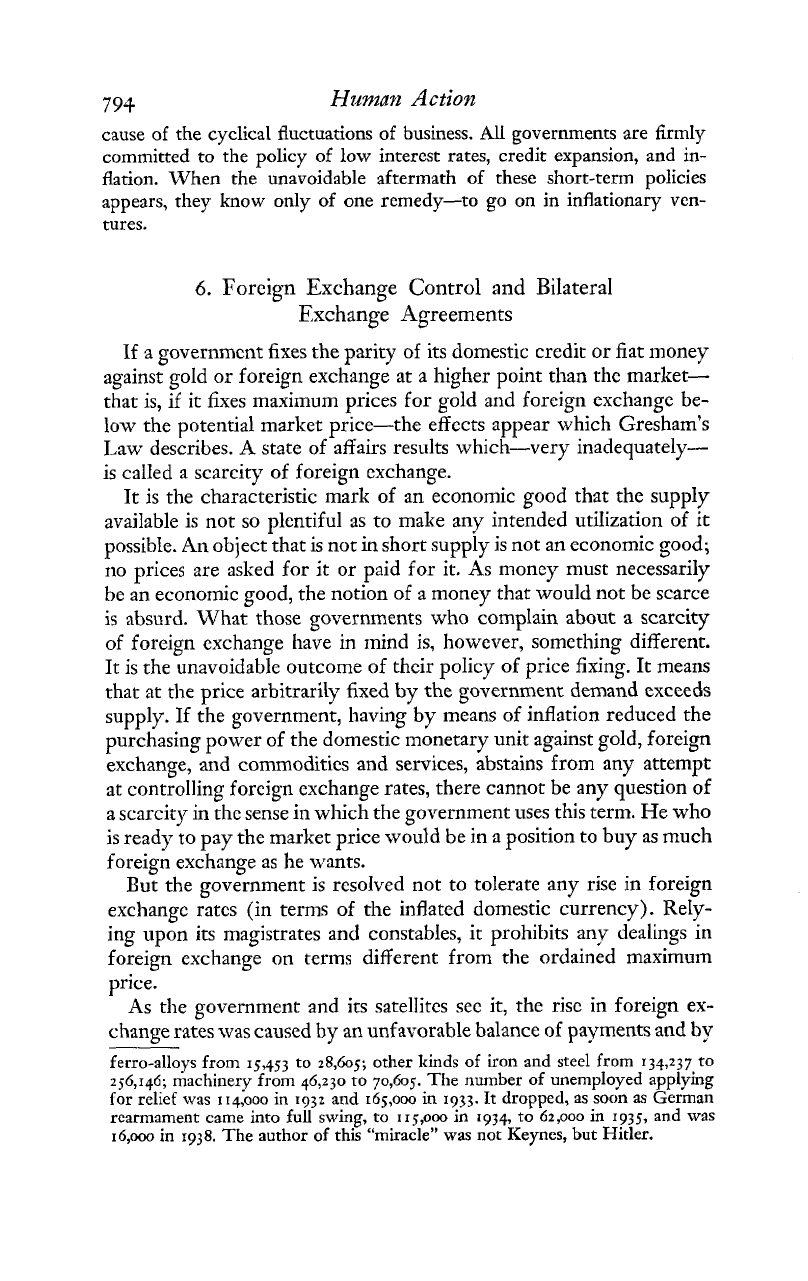
794
Hunzarz
Action
cause of the cyclical fluctuations of business.
All
governments are firmly
committed to the policy of
low
interest rates, credit expansion, and in-
flation. When the unavoidable aftermath
of
these short-term policies
appears, they know only of one remedy-to go on in inflationary ven-
tures.
6.
Foreign Exchange Control and Bilateral
Exchange Agreements
If a
government
fixes the parity of its domestic credit or fiat money
against gold or foreign exchange at a higher point than the market-
that is, if it fixes maximum prices for gold and foreign exchangc be-
low the potential market price-the effects appear which Gresham's
Law describes.
A
state of affairs results which-very inadequately-
is called a scarcity of foreign exchange.
It is the characteristic mark of an economic good that the supply
available is not so plentiful as to make any intended utilization of it
possible. An object that is not in short supply is not an economic good;
no prices are asked for it or paid for it. As money must necessarily
be
an economic good, the notion of a money that would not be scarce
is
absurd. What those governments who complain about a scarcity
of foreign exchange have in mind is, however, something different.
It is the unavoidablc outcome of thcir policy of price fixing. It means
that at the price arbitrarily fixed
by
the government demand exceeds
supply. If the government, having by means of inflation reduced the
purchasing power of the domestic monetary unit against gold, foreign
exchange, and commodities and services, abstains from any attempt
at controlling foreign exchange rates, there cannot be any question of
a
scarcity in thc sense in which the government uses this term. He who
is ready to pay the market price would be in a position to buy as much
foreign exchange as he wants.
But the government is resolved not to tolerate any rise
in
foreign
exchangc rates (in terms of the inflated domestic currency). ReIy-
ing upon its magistrates and constables, it prohibits any dealings in
foreign exchange on terms different from the ordained maximum
price.
As the government and its satellitcs see it, the rise in foreign ex-
change rates was caused by an unfavorable balance of payments and
by
ferro-alloys from 15,453
to
28,605; other
kinds
of
iron and steel from 134,237
to
256,146; machinery from 46,230
to
70,605.
The
number
of
unemployed applying
for relief
was
r
14,000
in
1932
and 165,000
in
1933.
It
dropped,
as
soon
as
German
rearmament
came
into
full
swing,
to
115,ooo
in
1934,
to
62,000
in
1935,
and
was
16,000
in
r938.
The
author of this "miracle"
was
not Keynes, but Hitler.
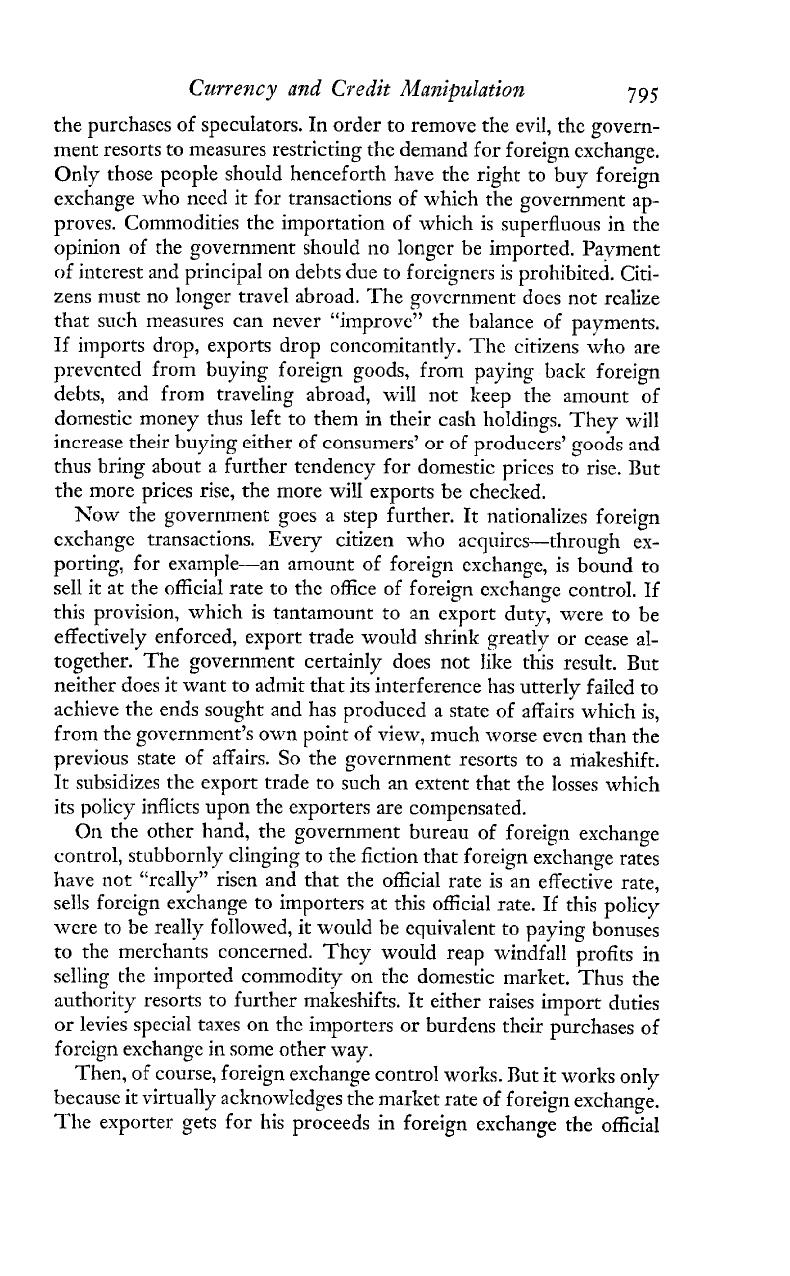
Currerzcy
and
Credit
Manipulation
795
the purchases of speculators. In order to remove the evil, the govern-
ment resorts to measures restricting the demand for foreign exchange.
Only those people should henceforth have the right to buy foreign
exchange who need it for transactions of which the government ap-
proves. Commodities the importation of which is superfluous in the
opinion of the government should no longer be imported. Pavment
of interest and principal on debts due to foreigners is Citi-
zens must no longer travel abroad. The government does not realize
that such measures can never "improve" the halance of payments.
If imports drop, exports drop concomitantly. The citizens who are
prevented from buying foreign goods, from paying back foreign
debts, and from traveling abroad, will not keep the amount of
domestic money thus left to them in their cash holdings. They will
increase their buying either of consumers' or of producers' goods and
thus bring about a further tendency for domestic prices to rise. But
the more prices rise, the more will exports be checked.
Now the government goes
a
step further. It nationalizes foreign
exchange transactions. Every citizen who acquires-through ex-
porting, for example-an amount of foreign exchange, is bound to
sell it at the official rate to the office of foreign exchange control. If
this provision, which is tantamount to an export duty, were to be
effectively enforced, export trade would shrink greatly or cease al-
together. The government certainly does not like this result. But
neither does it want to admit that its interference has utterly failed to
achieve the ends sought and has produced a state of affairs which is,
from the government's own point of view, much worse even than the
previous state of affairs. So the government resorts to a makeshift.
It subsidizes the export trade to such an extent that the losses which
its policy inflicts upon the exporters are compensated.
On
the other hand, the government bureau of foreign exchange
control, stubbornly clinging to the fiction that foreign exchange rates
have not "real1y"'risen and that the official rate is an effective rate,
sells foreign exchange to importers at this official rate. If this policy
w-cre to be really followed,
it
would be equivalent to paying bonuses
to the merchants concerned. They would reap windfall profits in
selling the imported commodity on the domestic market. Thus the
authority resorts to further makeshifts. It either raises import duties
or levies special taxes on thc importers or burdens their purchases of
foreign exchange in some other way.
Then, of course, foreign exchange control works. But it works only
because it virtually acknowledges the market rate of foreign exchange.
The exporter gets for his proceeds in foreign exchange the official
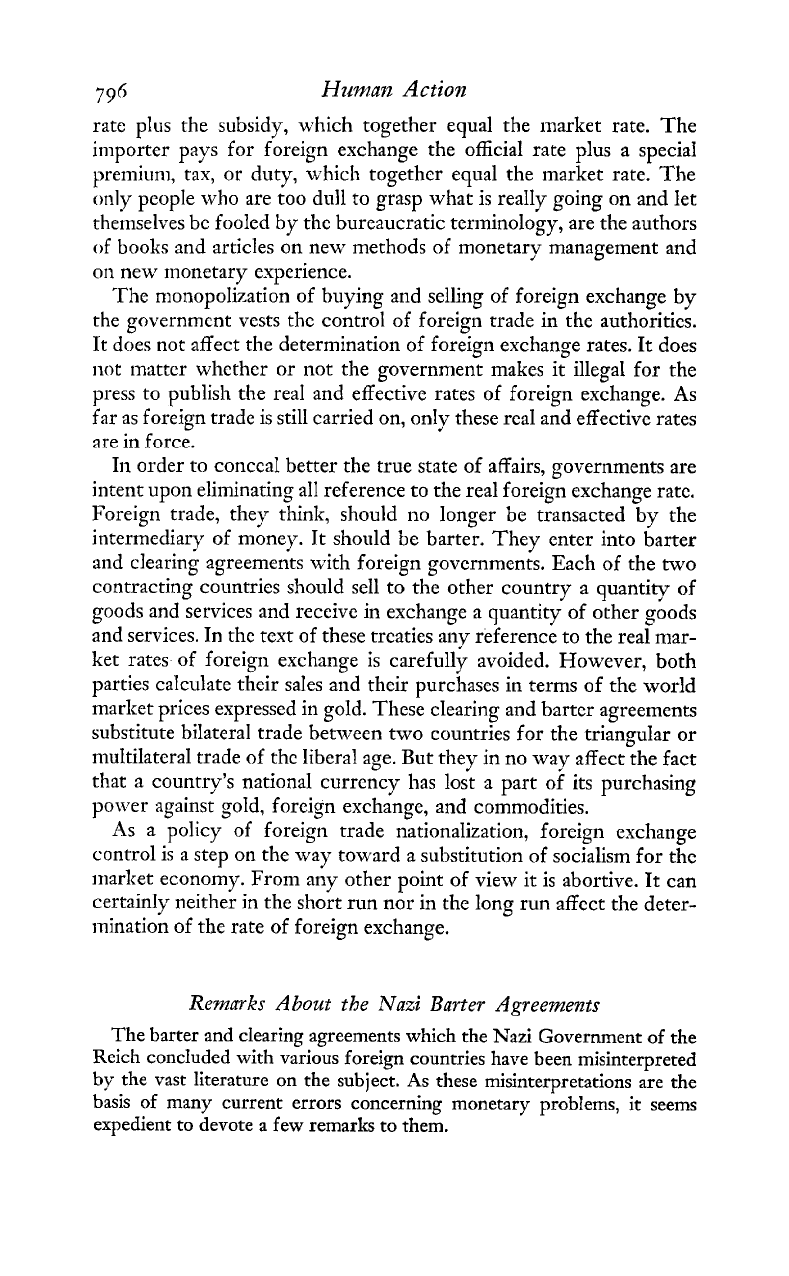
796
Human
Action
rate plus the subsidy, which together equal the market rate. The
importer pays for foreign exchange the official rate plus a special
premium, tax, or duty, which together equal the market rate. The
only people who are too dull to grasp what is really going on and let
themselves be fooled by the bureaucratic terminology, are the authors
of books and articles on new methods of monetary management and
on new monetary experience.
The n~ono~olization of buying and selling of foreign exchange by
the government vests the control of foreign trade in the authorities.
It does not affect the determination of foreign exchange rates. It does
not matter whether or not the government makes it illegal for the
press to publish the real and effective rates of foreign exchange. As
far as foreign trade is still carried on, only these real and effective rates
are in force.
In order to conceaI better the true state of affairs, governments are
intent upon eliminating all reference to the real foreign exchange rate.
Foreign trade, they think, should no longer be transacted by the
intermediary of money. It should be barter. They enter into barter
and clearing. agreements with foreign governments. Each of the two
contracting countries should sell to the other country a quantity of
goods and services and receive in exchange a quantity of other goods
and services. In the text of these treaties any reference to the real mar-
ket rates of foreign exchange is carefully avoided. However, both
parties caIculate their sales and their purchases in terms of the world
market prices expressed in gold. These clearing and barter agreements
substitute bilateral trade between two countries for the triangular or
multilateral trade of the liberal age. But they in no way affect the fact
that
a
country's national currency has lost a part of its purchasing
power against gold, foreign exchange, and commodities.
As a policy of foreign trade nationalization, foreign exchange
control is a step on the way toward a substitution of socialism for the
market economy. From any other point of view it is abortive. It can
certainly neither in the short run nor in the long run affect the deter-
mination of the rate of foreign exchange.
Remarks
About
the Nazi Barter Agreements
The barter and clearing agreements which the Nazi Government of the
Rcich conchded with various foreign countries have been misinterpreted
by the vast literature on the subject. As these misinterpretations are the
basis of many current errors concerning monetary problems, it seems
expedient to devote a few remarks to them.
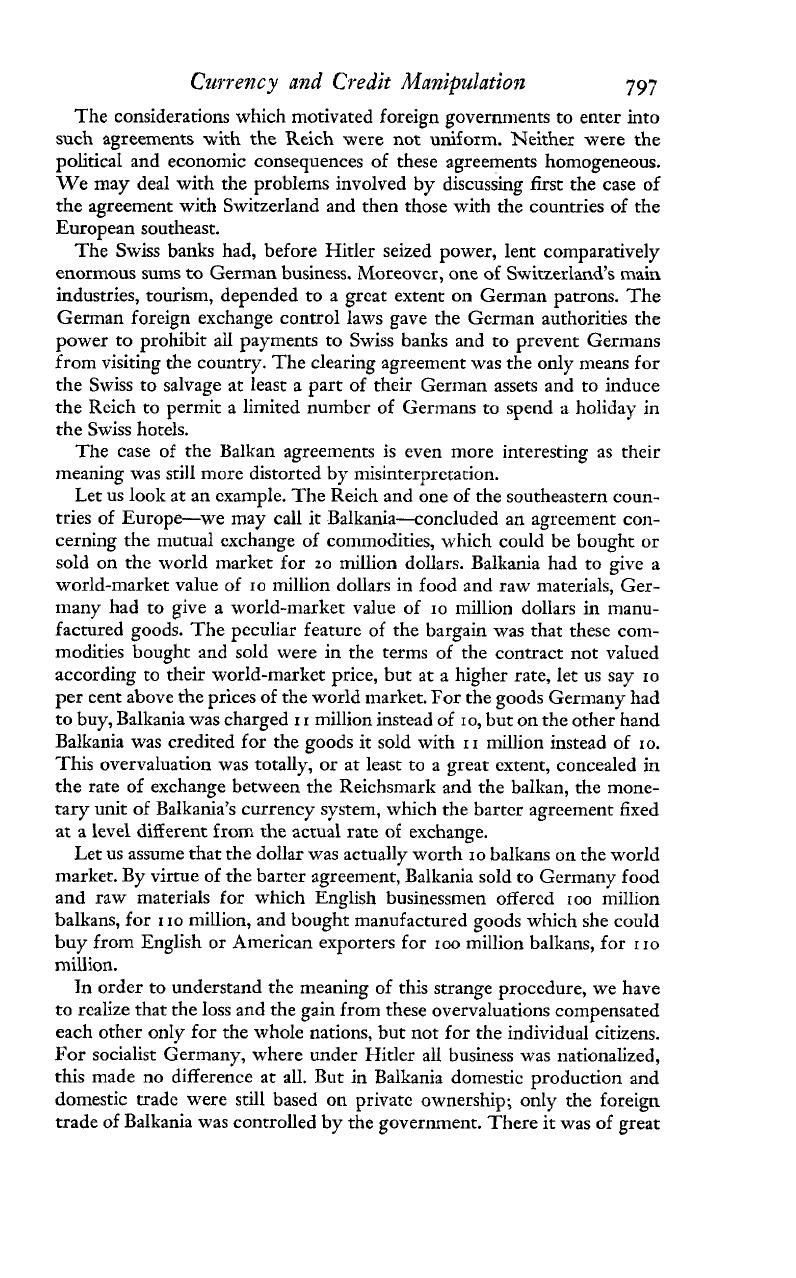
Cwrency
and
Cwdit
Manipulation
797
The considerations which motivated foreign governments to enter into
such agreements with the Reich were not uniform. Neither were the
political and economic consequences of these agreements homogeneous.
We may deal with the problems involved by discussing first the case of
the agreement with Switzerland and then those with the countries of the
European southeast.
The Swiss banks had, before Hitler seized power, lent comparatively
enormous sums to German business. Moreover, one of Switzerland's main
industries, tourism, depended to a great extent on German patrons. The
German foreign exchange control laws gave the German authorities the
power to prohibit all payments to Swiss banks and to prevent Germans
from visiting the country. The clearing agreement was the only means for
the Swiss to salvage at least a part of their German assets and to induce
the Reich to permit a limited number of Germans to spend a holiday in
the Swiss hotels.
The case of the Balkan agreements is even more interesting as their
meaning was srill more distorted by misinterpretation.
Let us look at an example. The Reich and one of the southeastern coun-
tries of Europe-we may call it Balkania--concluded an agreement con-
cerning the mutual exchange of commodities, which could be bought or
sold on the world market for
20
million dollars. Balkania had to give a
world-market value of
10
million dollars in food and raw materials, Ger-
many had to give a world-market value of
10
million dollars in manu-
factured goods. The pcculiar feature of the bargain was that these com-
modities bought and sold were in the terms of the contract not valued
according to their world-market price, but
at
a higher rate, let us say
10
per cent above the prices of the world market. For the goods Germany had
to buy, Balkania was charged
I
I
million instead of
10,
but on the other hand
Balkania was credited for the goods it sold with
I I
million instead of
10.
This overvaluation was totally, or at least to a great extent, concealed in
the rate of exchange between the Reichsmark and the balkan, the mone-
tary unit of Balkania's currency system, which the barter agreement fixed
at
a
level different from the actual rate of exchange.
Let us assume that the dollar was actually worth
10
balkans on the world
market. By virtue of the barter agreement, Balkania sold to Germany food
and raw materials for which English businessmen offercd
roo
million
balkans, for
I
10
million, and bought manufactured goods which she could
buy from English or American exporters for
IOO
million balkans, for
I
10
million.
Tn order to understand the meaning of this strange proccdure, we have
to realize that the loss and the gain from these overvaluations compensated
each other onIy for the whole nations, but not for the individual citizens.
For socialist Germany, where under Hitler all business was nationalized,
this made no difference at all. But in Balkania domestic production and
domestic trade were still based on privatc ownership; only the foreign
trade of Balkania was controlled by the government. There it was of great
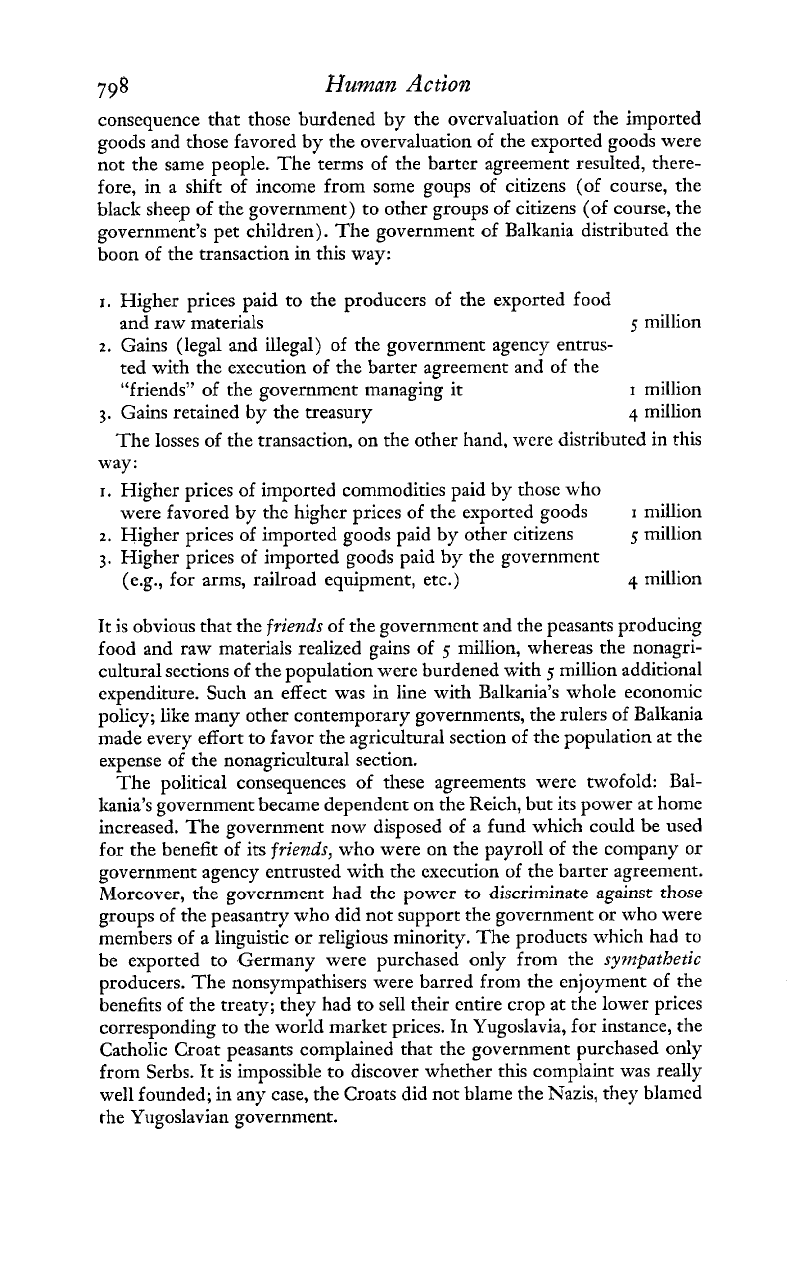
798
Human
Action
consequence that those burdened by the ovcrvaluation of the imported
goods and those favored by the overvaluation of the exported goods were
not the same people. The terms of the barter agreement resulted, there-
fore, in a shift of income from some goups of citizens (of course, the
black sheep of the government) to other groups of citizens (of course, the
government's pet children). The government of Balkania distributed the
boon of the transaction in this way:
r.
Higher prices paid to the producers of the exported food
and raw materials
5
million
2.
Gains (legal and illegal) of the government agency entrus-
ted with the execution of the barter agreement and of the
"friends" of the government managing it
I
million
3.
Gains retained by the treasury
4
million
The losses of the transaction, on the other hand, were distributed in this
way:
r.
Higher prices of imported commodities paid by those who
were favored by the higher prices of the exported goods
I
million
z.
Higher prices of imported goods paid by other citizens
5
million
3.
Higher prices of imported goods paid by the government
(e.g., for arms, railroad equipment, etc.)
4
million
It is obvious that the
friends
of the government and the peasants producing
food and raw materials realized gains of
5
million, whereas the nonagri-
cultural sections of the population were burdened with
5
million additional
expenditure. Such an effect was in line with Balkania's whole econonlic
policy; like many other contemporary governments, the rulers of Balkania
made every effort to favor the agricultural section of the population at the
expense of the nonagricultural section.
The political consequences of these agreements were twofold: Bal-
kania's government became dependent on the Reich, but its power at home
increased. The government now disposed of a fund which could be used
for the benefit of its
friends,
who were on the payroll of the company or
government agency entrusted with the execution of the barter agreement.
nn
A,
,.-.,-,.....
-..+
LA
+L,
..,..,,,
+,
A:~,~;~;..,+~
nrrn;nrt
thnco
IVIULC.UVGL)
LLIG
EVYLLIIIIILIIL
lldU
LLIL
YU
WLL
CV
UIJLIIIIIIIIaCb
a6alll-c
CIIVar
groups of the peasantry who did not support the government or who were
members of
a
linguistic or religious minority. The products which had to
be exported to Germany were purchased only from the
sympathetic
producers. The nonsympathisers were barred from the enjoyment of the
benefits of the treaty; they had to sell their entire crop at the lower prices
corresponding to the world market prices. In Yugoslavia, for instance, the
Catholic Croat peasants complained that the government purchased only
from Serbs. It is impossible to discover whether this complaint was really
well founded; in any case, the Croats did not blame the Nazis, they blamed
the Yugoslavian government.
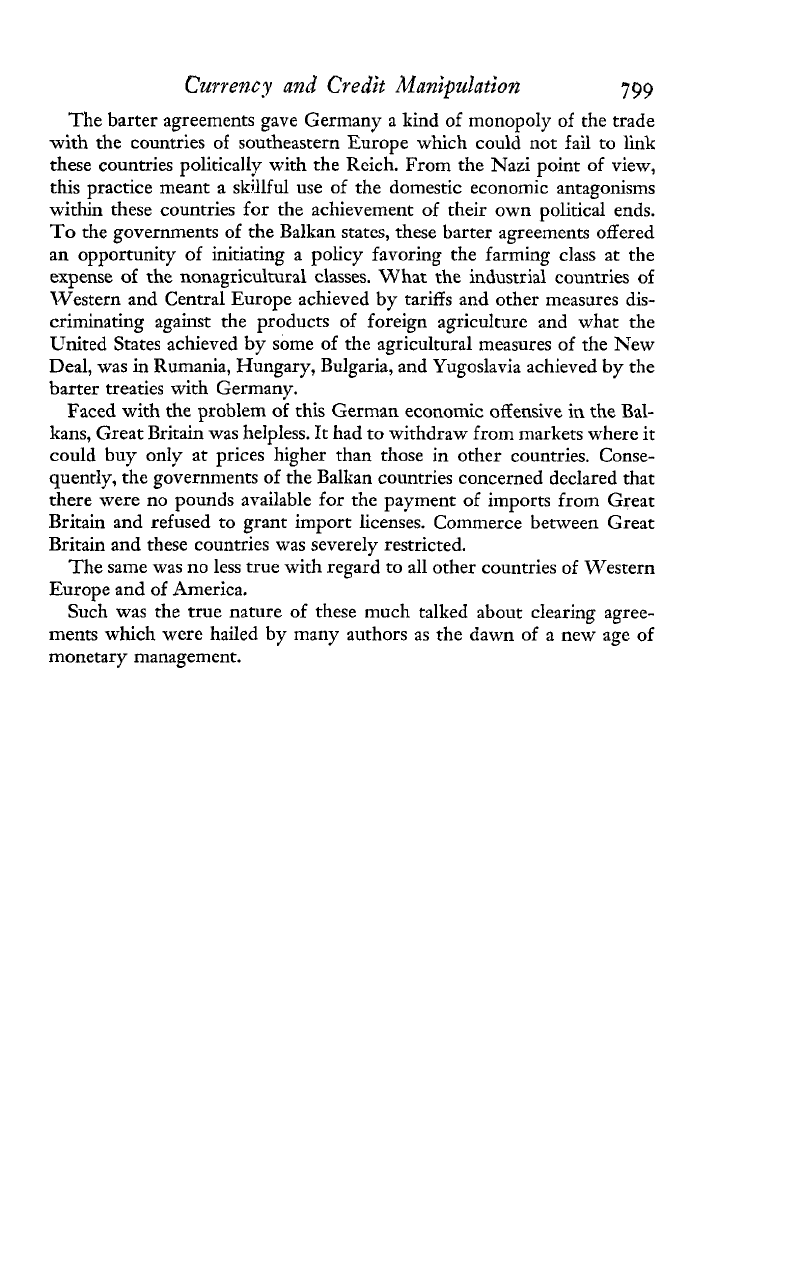
Currency and Credit Manipulation
799
The barter agreements gave Germany a kind of monopoly of the trade
with the countries of southeastern Europe which could not fail to link
these countries politically with the Rcich. From the Nazi point of view,
this practice meant a skillful use of the domestic economic antagonisms
within these countries for the achievement of their own political ends.
To the governments of the Balkan states, these barter agreements offered
an opportunity of initiating
a
policy favoring the farming class at the
expense of the nonagricultural classes. What the industrial countries of
Western and Central Europe achieved by tariffs and other measures dis-
criminating against the products of foreign agriculcurc and what the
United States achieved by some of the agricultural measures of the New
Deal, was in Rumania, Hungary, Bulgaria, and Yugoslavia achieved by the
barter treaties with Germany.
Faced with the problem of this German economic offensive
in
the Bal-
kans, Great Britain was helpless. It had to withdraw from markets where it
could buy only at prices higher than those in other countries. Conse-
quently, the governments of the Balkan countries concerned declared that
there were no pounds available for the payment of imports from Great
Britain and refused to grant import licenses. Cotnmerce between Great
Britain and these countries was severely restricted.
The same was no less true with regard to all other countries
of
Western
Europe and of America.
Such was the true nature of these much talked about clearing agree-
ments which were hailed by many authors as the dawn of a new age of
monetary management.
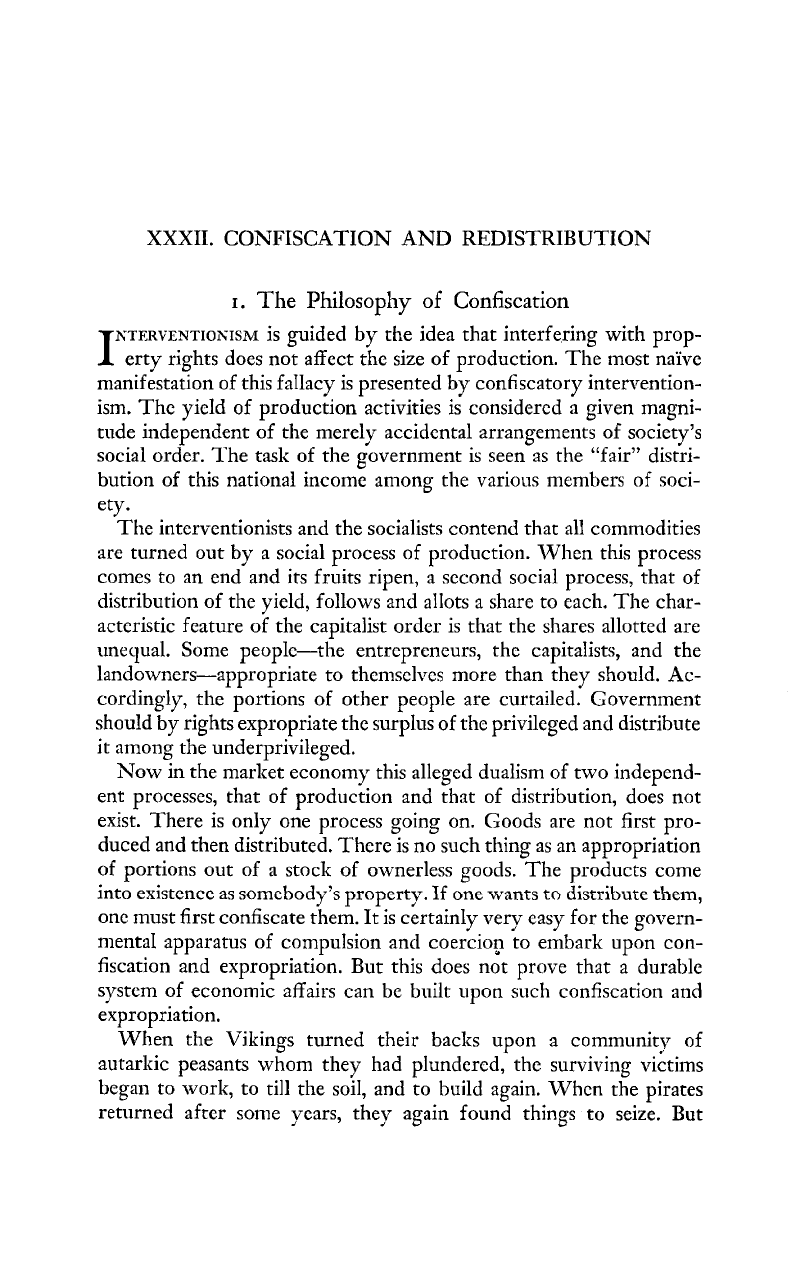
XXXII. CONFISCATION
AND
REDISTRIBUTION
I.
The Philosophy of Confiscation
I
NTERVENTIOXISM
is guided by the idea that interfering with prop-
erty rights does not affect the size of production. The most na'ive
manifestation of this faIlacy is presented by confiscatory intervention-
ism. The yield of production activities is considered a given magni-
tude independent of the merely accidental arrangements of society's
social order. The task of the government is seen as the "fair" distri-
bution of this national income among the various members of soci-
ety.
The interventionists and the socialists contend that all commodities
are turned out by a social process of production. When this process
comes to an end and its fruits ripen, a second social process, that of
distribution of the yield, follows and alIots a share to each. The char-
acteristic feature of the capitalist order is that the shares allotted are
unequal. Some people-the entrepreneurs, the capitalists, and the
landowners-appropriate to themselves more than they should. Ac-
cordingly, the portions of other people are curtailed. Government
should by rights expropriate the surplus of the privileged and distribute
it among the underprivileged.
Now in the market economy this alleged dualism of two independ-
ent processes, that of production and that of distribution, does not
exist. There is only one process going on. Goods are not first pro-
duced and then distributed. There is no such thing as an appropriation
of
portions out of a stock of ownerless goods. The products come
:"+-
a-:'.+n"nn
,..-
.-,,--L,.A.7?,-
"+--
TC
/...,.
-.,"...+"
+,.
A:"+..:L...+"
+Le-
JllLll
LAIJLLIILL dJ JVIIILLIUU
3
JI\J
IL1I.V. 11 UllG
W
LLLlLa
LIJ UI3LLlLJULC L11G11I3
Yli,
one must first confiscate them. It is certainly very easy for the govern-
nlentaI apparatus of compulsion and coercio~ to embark upon con-
fiscation and expropriation. But this does not prove that a durable
system of economic affairs can be built upon such confiscation and
expropriation.
When the Vikings turned their backs upon a community of
autarkic peasants whom they had plundered, the surviving victims
began to work, to till the soil, and to build again. When the pirates
returned after some years, they again found things to seize. But
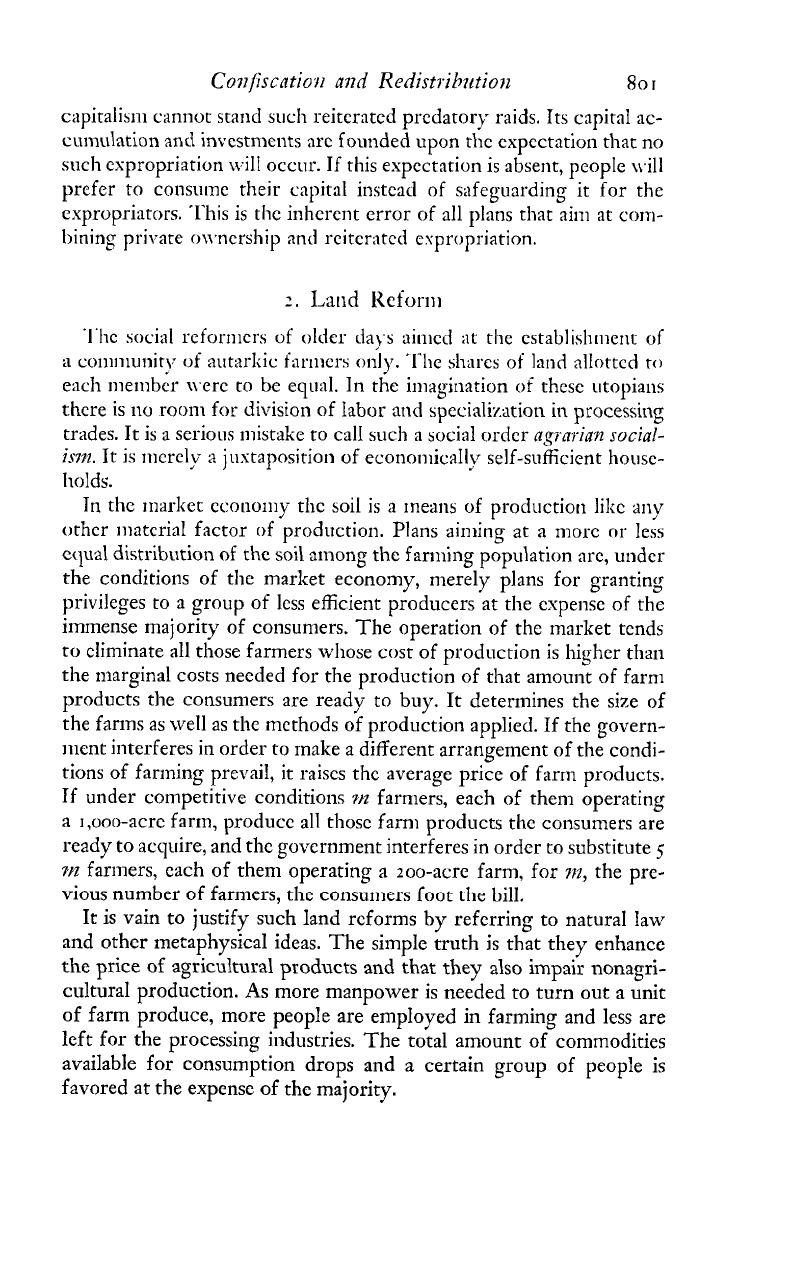
Co~z/iscntian and
Redistribution
80
I
capitalism cannot stand such reiterated predatory raids. Its capital ac-
cumulation
and
investnlents are founded upon the expectation that no
such
expropriation
u.ill occur.
If
this expectation is absent, people
\\.ill
prefer to consume their capital instead of safeguarding it for the
expropriators. This is the inherent error of all plans that aim at cotn-
lining private oumrship and rciterntcd e~propriation.
'I'he social reforniers of older da).s ainlecl at the establishnient
of
a
cotlimunit\:
of
autarkic fanners only. .lh shares
of'
land alfottcd
to
each member \\.ere to be equal. In the iinagiilation of these ~~topians
there is no room
for
division of labor and specializ~tion
in
processing
trades. It is a serious mistake to call such a social order
agrarian
social-
imz.
It is rnerely
a
juxtaposition of econoniicallv self-sufficient housc-
holds.
In
the lr~arltet econoiny the soil is a Ineatis of production Iilw any
other material factor of production. Plans aiming at a more or less
ccpl distribution
of
the
soil
among the farnling population
arc,
under
the conditions of the market economy, merely plans for granting
privileges to a group of less efficient producers at the expense of the
immense majority of consumers. The operation of the market tends
to diminate all tlke farmers whose cost of production is higher than
the marginal costs needed for the production of that amount of farm
products the consumers are ready to buy.
It
determines the size of
the farms as well as the methods of production applied. If the govern-
ment interferes in order to make a different arrangement of the condi-
tions of farming prevail, it raises the average price of farm products.
If under competitive conditions
m
farmers, each of them operating
a 1,000-acrc farm, produce all those farm products the consumers are
ready to acquire,
and
the government interferes
in
order to substitute
5
~n
farmers, each of them operating a zoo-acre farm, for
7n,
the pre-
vious number of farmers, the consumers foot the bill.
It
is
vain to justify such land reforms by referring to natural
law
and othcr metaphysical ideas. The simple truth is that they enhance
the price of agricultural products and that they also impair nonagri-
cultural production. As more manpower is needed to turn out a unit
of farm produce, more people are employed in farming and less are
left for the processing industries. The total amount of commodities
available for consumption drops and
a
certain group of people is
favored at the expense of the majority.
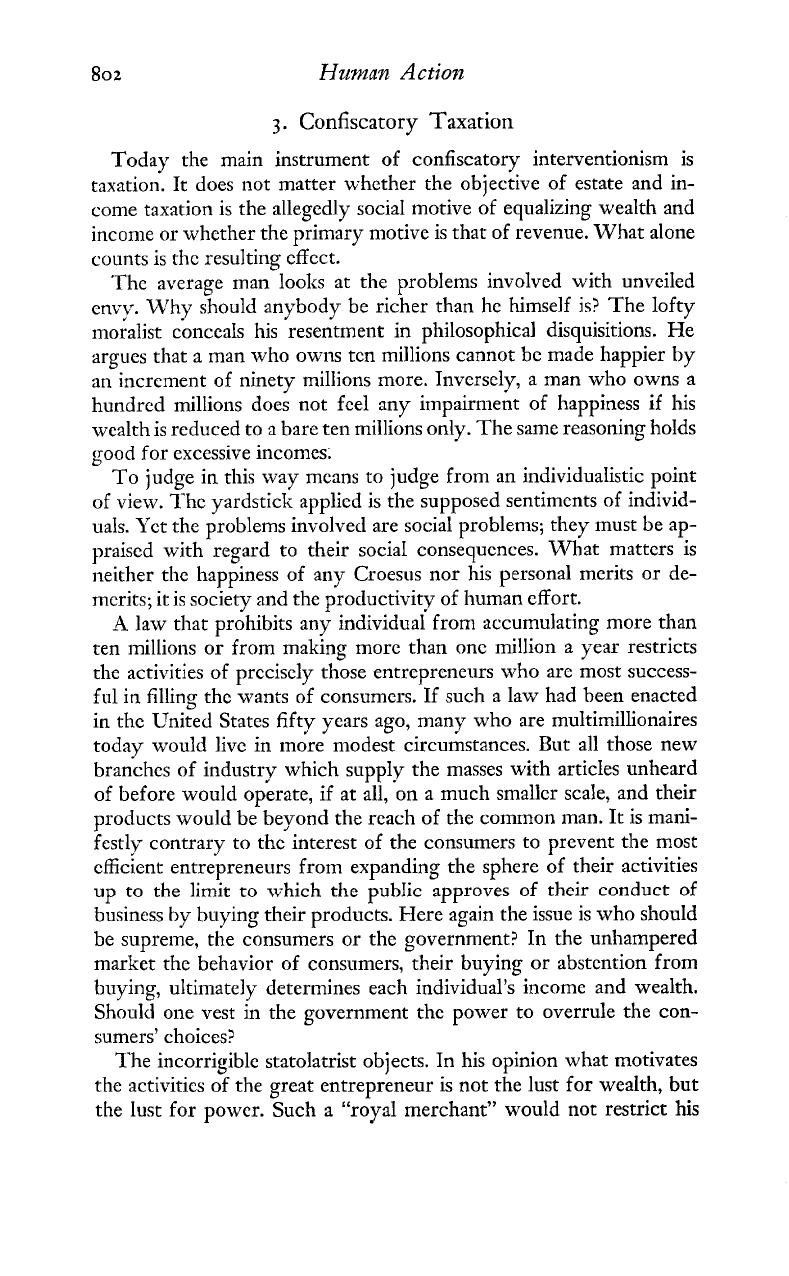
802
Human
Action
3.
Confiscatory Taxation
Today the main instrument of confiscatory interventionism is
taxation. It does not matter whether the objective of estate and in-
come taxation is the allegedly social motive of equalizing wealth and
income or whether the primary motive is that of revenue. What alone
counts is the resulting effect.
The average man looks at the problems involved with unveiled
envy.
Why
should anybody be richer than he himself is? The lofty
moralist cbncea~s his resentment in philosophical disquisitions. He
argues that a man who owns ten millions cannot be made happier by
an increment of ninety millions more. Inversely, a man who owns a
hundred millions does not feel any impairment of happiness if his
wealth is reduced to a hare ten millions only. The same reasoning holds
good for excessive incomes.
To judge in this way means to judge from an individualistic point
of view. The yardstick applied is the supposed sentiments of individ-
uals. Yet the problems involved are social problems; they must be ap-
praised with regard to their social consequences. What matters is
neither the happiness of any Croesus nor his personal merits or de-
merits; it is society and the productivity of human effort.
A
law that prohibits any individuai from accumulating more than
ten millions or from making more than one million
a
year restricts
the activities of prccisely those entrepreneurs who arc most success-
ful
in
filling the wants of consumers. If such a law had been enacted
in thc United States fifty years ago, many who are multimillionaires
today would live in more modest circukstances. But all those new
branches of industry which supply the masses with articles unheard
of before would operate,
if
at all, -on a much smaller scale, and their
products would be beyond the reach of the common man. It is mani-
festly contrary to the interest of the consumers to prevent the most
efficient entrepreneurs from expanding the sphere of their activities
1-p
the
..;hi&
rjIe
m~hlir
gnnrnvec
~f
their
~ondijct
of
r
r
-ST--
-rrA--
--
business by buying their products. Here again the issue is who should
be supreme, the consumers or the government?
In
the unhampered
market the behavior of consumers, their buying or abstention from
buying, ultimately determines each individual's income and wealth.
Should one vest in the government the power to overrule the con-
sumers' choices?
The incorrigible statolatrist objects. In his opinion what motivates
the activities of the great entrepreneur is not the lust for wealth, but
the lust for power. Such
a
"royal merchant" would not restrict his
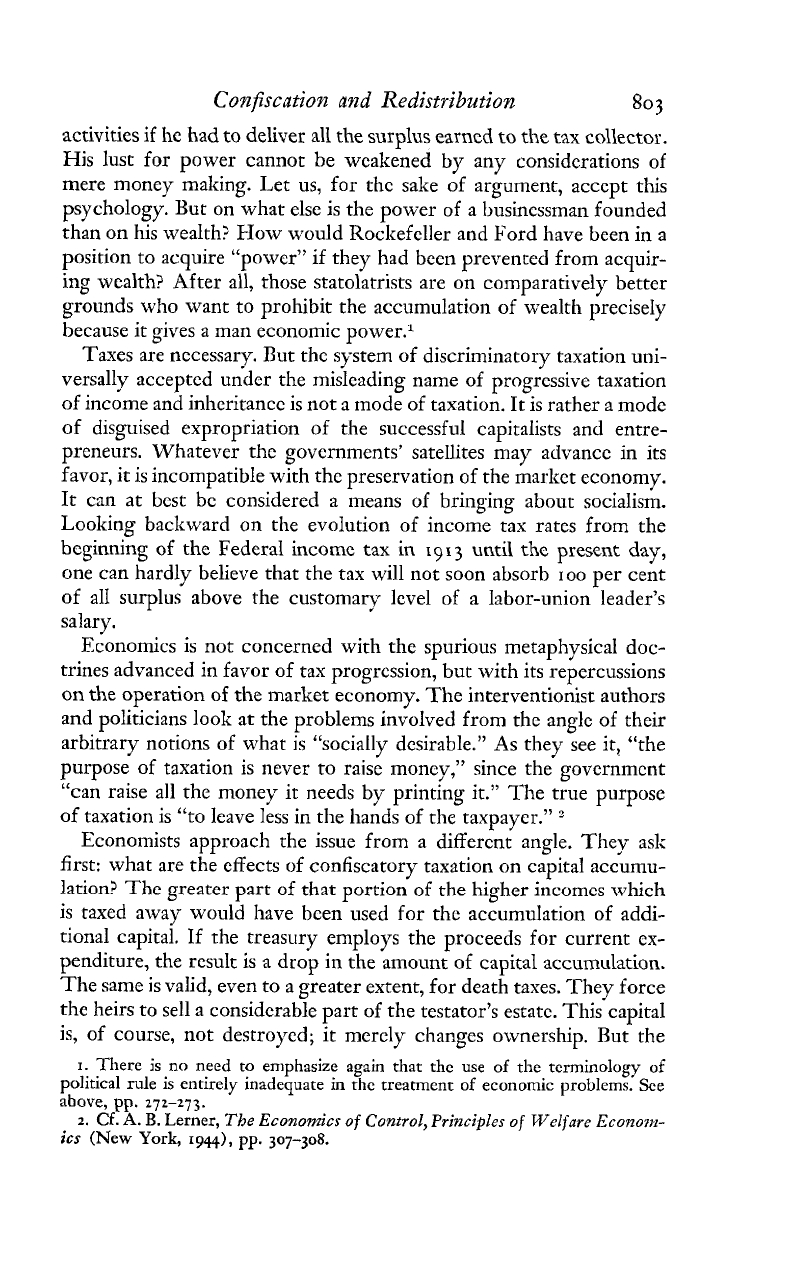
Confiscation and Redistribution
803
activities if he had to deliver
all
the surplus earned
to
the tax collector.
His lust for power cannot he weakened by any considcrations of
mere money making. Let us, for the sake of argument, accept this
psychology. But on what else is the power of a businessman founded
than on his wealth? How would Rockefeller and Ford have been in a
position to acquire "power" if they had been prevented from acquir-
ing wealth? After all, those statolatrists are on comparatively better
grounds who want to prohibit the accumulation of wealth precisely
because it gives a man economic p0wer.l
Taxes are necessary. But the system of discriminatory taxation uni-
versally accepted unher the misleading name of progressive taxation
of income and inheritance is not a mode of taxation. It is rather a mode
of disguised expropriation of the successful capitalists and entre-
preneurs.
Whatever the govcrnments' satellites may advance in its
favor, it is incompatible with the preservation of the marltet economy.
It can at best be considered a means of bringing about socialism.
Looking backward
on
the evolution of income tax rates from the
beginning of the Federal income tax
in
19s
3
until
the
present
day,
one can hardly believe that the tax will not soon absorb loo per cent
of a11 surplus above the customary level of a labor-union leader's
salary.
Economics is not concerned with the spurious metaphysical doc-
trines advanced in favor of tax progression, but with its repercussions
on
the operation of the market economy. The interventionist authors
and politicians look at the problems involved from the angle of their
arbitrary notions of what is "socially desirable." As they see it, "the
purpose of taxation is never to raise moncy," since the govcrnmcnt
"can raise all the money it needs by printing it." The true purpose
of taxation is "to leave less in the hands of the taxpayer."
?
Economists approach the issue from a differcnt angle. They ask
first: what are the effects of confiscatory taxation on capital accumu-
lation? The greater part of that portion of the higher incomcs which
is taxed away would have been used for the accumulation of addi-
tional capital. If the treasury employs the proceeds for current ex-
penditure, the result is a drop in the amount of capital accumulation.
The same is valid, even to a greater extent, for death taxes. They force
the heirs to sell a considcrable part of the testator's estatc. This capital
is, of course, not destroyed; it merely changes ownership. But the
I.
There
is
no need to emphasize again that the use of the terminology of
political rule
is
entirely inadequate in the treatment of economic problems.
See
above,
pp.
272-273.
2.
Cf.
A.
B.
Lerner,
The
Economics of Control, Principles of Welfare Econom-
ics
(New
York,
I%),
pp.
307-308.
